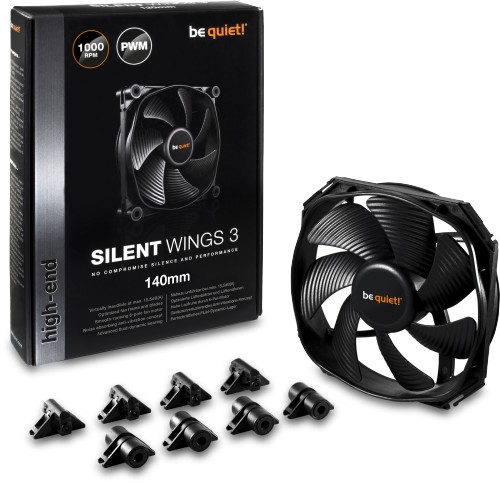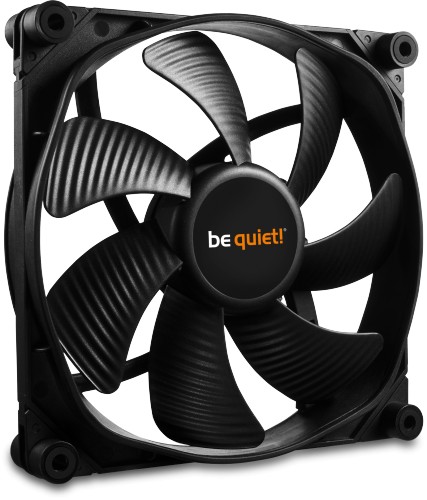Silent Wings 3 140mm PWM Quiet Fan, BL067 Discontinued | |
| More variations available Show | |
be quiet Silent Wings 3 140mm PWM Quiet Fan, BL067
The SilentWings 3 is perfectly balance between cooling and silence with a maximum airflow of 15.5 db(A) and meets all the requirements to be a perfect choice for cooling.
Features
- Virtually inaudible operation at 15.5 dB(A) PWM fan
- 6-pole fan motor with three phases giving less vibration
- Advanced fluid-dynamic bearing (FDB) enables a long fan life
- Seven fan blades with optimised surface structures ensure excellent airflow
- The rubberised fan frame producing extremely high air pressure
- Removable anti-vibration mountings minimise the transmission of vibrations
be quiet! SilentWings fans stand for state-of-the-art technology, virtually inaudible operation and superior cooling. The third generation of this award-winning fan series offers unrivalled and uncompromising performance with a broad range of meticulous optimisations. They feature a smooth-running 6-pole motor, an advanced fluid-dynamic bearing, a unique airflow-optimised fan blade design and a fan frame with funnel-shaped air inlets. The six poles of the motor produce a smoother transition between the magnetic poles. This results in very low vibration and silent operation with less energy consumption.
The SilentWings 3 140mm model combines all of the above best-in-class features. It strikes the perfect balance between cooling and silence with a maximum of 15.5 db(A) and meets all the requirements to be a perfect choice for heat sinks, PC cases and radiators.
| Specifications | SW3 140mm PWM BL067 |
|---|---|
| Model Number | BL065 |
| Size | 140 x 140 x 25 mm |
| Rotational Speed | 1000 RPM |
| Airflow | 59.5 CFM |
| Static pressure | 1.08 mm H₂O |
| Noise Level | 15.5 dBA |
| Bearing technology | FDB |
| Motor technology | 6-pole fan motor |
| Connector | 4-pin PWM |
| Cable length (mm) | 500 |
| Lifespan (hours @25°C) | 300,000 |
| Voltage | 12 V |
| Operating voltage DC (V) | 5 ~ 13.2 |
| Current consumption (A) | 0.06 |
| Safety current (A) | 0.3 |
| Input power (W) | 0.72 |
| Accessories | Screws, Push pins, Silica gel washers |
| Safety Approvals | CE, RoHS, WEEE, RU, Tüv |
| Warranty | 24 months |
| EAN barcode | 4260052184271 |
| Specifications | SW3 140mm PWM BL067 |
|---|---|
| Model Number | BL065 |
| Size | 140 x 140 x 25 mm |
| Rotational Speed | 1000 RPM |
| Airflow | 59.5 CFM |
| Static pressure | 1.08 mm H₂O |
| Noise Level | 15.5 dBA |
| Bearing technology | FDB |
| Motor technology | 6-pole fan motor |
| Connector | 4-pin PWM |
| Cable length (mm) | 500 |
| Lifespan (hours @25°C) | 300,000 |
| Voltage | 12 V |
| Operating voltage DC (V) | 5 ~ 13.2 |
| Current consumption (A) | 0.06 |
| Safety current (A) | 0.3 |
| Input power (W) | 0.72 |
| Accessories | Screws, Push pins, Silica gel washers |
| Safety Approvals | CE, RoHS, WEEE, RU, Tüv |
| Warranty | 24 months |
| EAN barcode | 4260052184271 |
Product Resources
FAQ
How do I measure fan size?
The size of fan you need will generally be determined by the size of the fan fitting position in your PC case. The sizes of all the fans on our website are shown as measured along any one of the fan’s four sides, NOT the distance between the fan’s screw holes! Our most popular fan size is 120mm, followed by 80mm. This isn’t really dictated by customer preference, but more by recent designs of PC cases.
As for the thickness (depth) of the fan, generally 25mm (1 inch) is by far the most common depth, although smaller fans can have shallower depths such as 15mm or even 10mm. All our fans are 25mm thick unless otherwise stated. If you have any questions about which fan you should order, please don’t hesitate to get in touch.
If you know the distance between the fan mounting screw holes but don’t know what fan size to order, please see the following table. Note that the mounting hole measurements shown below are taken horizontally or vertically between the holes and not diagonally.
Screw hole spacings and fan sizes
Space Between Screw Holes Fan Size 32mm 40mm 40mm 50mm 50mm 60mm 60mm 70mm 72mm 80mm 83mm 92mm 105mm 120mm I received a small cable (resistor) with my fan; what is it for?
The resistor cable (also called Ultra Low Noise or ULN cable) is designed to allow the fan to run slightly slower for even quieter operation. The benefit in lower running noise is significant. Although the airflow will be reduced slightly, this usually has minimal effect on PC temperature. We would generally recommend using the ULN resistor cable for best results in almost all circumstances.
How can I tell which way the air blows through the fan?
Hold the fan so that the round fan sticker is facing you. You are looking at the rear of the fan. When you plug the fan in, the air will be blowing towards you. If you want a fan to act as an air intake, then the fan sticker will be facing the inside of the case. Some fans also have two small arrows moulded into their plastic housing - one arrow shows the direction of airflow, and the other (at 90°) shows the direction of blade rotation.
Is it possible to use a 4-pin PWM fan or CPU cooler with a motherboard which has only 3-pin fan headers on it?
Electrically, there is no problem doing this - the fourth pin on the fan cable is used purely for PWM control and is not needed in order for the fan to run. So you can plug the 4-pin fan connector onto the 3-pin motherboard fan header, leaving the fourth pin not connected to anything. The fan will potentially run at full speed, so if you would like to reduce the speed of the fan you will need to adjust the fan speed setting in your BIOS or use fan control software such as SpeedFan in Windows.
The only other problem to consider is that occasionally, components immediately adjacent to the motherboard fan header can get in the way of the larger 4-pin fan connector, physically preventing connection. This problem also occurs if you try to use an in-line fan speed controller such as the one made by Gelid.
Another avenue to explore is the possibility of using a bay-mounted fan controller. Several models are available now which provide 4-pin fan headers, so this is an easy way to use 4-pin PWM fans in a PC system which has only 3-pin fan headers on its motherboards. When using this method, you may find it necessary to disable any fan warning settings in your motherboard BIOS, since the motherboard may incorrectly believe that its CPU fan has failed when the fan is connected to a fan controller rather than directly to the motherboard itself.
Top Quiet Fans
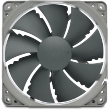
Noctua NF-P12 REDUX PWM 12V 1700RPM 120mm Quiet Case Fan

Noctua NF-A12x25 PWM chromax.black.swap 12V 2000RPM 120mm Fan

Noctua NF-F12 iPPC PWM 12V 3000RPM 120mm High Performance Fan
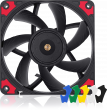
Noctua NF-A12x15 PWM chromax.black.swap 12V 1850RPM 120x15mm Fan

Noctua NF-R8 REDUX 12V 1800RPM 80mm Quiet Case Fan

Noctua NF-A12x25 PWM 12V 2000RPM 120mm Ultimate Quality Quiet Fan
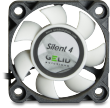
Gelid Silent 4, 40mm Quiet Case Fan

Noctua NF-R8 REDUX PWM 12V 1800RPM 80mm Quiet Case Fan

Noctua NF-F12 iPPC PWM 12V 2000RPM 120mm High Performance Fan

Noctua NF-A8 PWM 12V 2200RPM 80mm Premium Quality Fan

